
 This edition first published in 2017 by Conari Press, an imprint of Red Wheel/Weiser, LLC With offices at: 65 Parker Street, Suite 7 Newburyport, MA 01950 www.redwheelweiser.com Copyright 2017 by Russ Kick All rights reserved. No part of this publication may be reproduced or transmitted in any form or by any means, electronic or mechanical, including photocopying, recording, or by any information storage and retrieval system, without permission in writing from Red Wheel/Weiser, LLC. Reviewers may quote brief passages. Previously published in 2015 as Flash Wisdom by Disinformation Books, an imprint of Red Wheel/Weiser, ISBN: 978-1-938875-12-0. ISBN: 978-1-57324-694-1 Library of Congress Cataloging-in-Publication Data Flash wisdom : a curated collection of mind-blowing, perspective-changing, and eye-opening quotes / [edited by] Russ Kick. pages cm Summary: This book collects surprising, jolting, discomforting, and comforting insights into living a full, unbridled life, questioning authority and reality, relating to fellow humans, creating, risking, loving, living with uncertainty, and staying sane in an insane world--Provided by publisher.
This edition first published in 2017 by Conari Press, an imprint of Red Wheel/Weiser, LLC With offices at: 65 Parker Street, Suite 7 Newburyport, MA 01950 www.redwheelweiser.com Copyright 2017 by Russ Kick All rights reserved. No part of this publication may be reproduced or transmitted in any form or by any means, electronic or mechanical, including photocopying, recording, or by any information storage and retrieval system, without permission in writing from Red Wheel/Weiser, LLC. Reviewers may quote brief passages. Previously published in 2015 as Flash Wisdom by Disinformation Books, an imprint of Red Wheel/Weiser, ISBN: 978-1-938875-12-0. ISBN: 978-1-57324-694-1 Library of Congress Cataloging-in-Publication Data Flash wisdom : a curated collection of mind-blowing, perspective-changing, and eye-opening quotes / [edited by] Russ Kick. pages cm Summary: This book collects surprising, jolting, discomforting, and comforting insights into living a full, unbridled life, questioning authority and reality, relating to fellow humans, creating, risking, loving, living with uncertainty, and staying sane in an insane world--Provided by publisher.
ISBN 978-1-938875-12-0 (paperback) 1. Conduct of life--Quotations, maxims, etc. 2. Wisdom--Quotations, maxims, etc. I. Kick, Russell, editor of compilation.
PN6084.C556F62 2015 081--dc23 201404175 Cover design by Jim Warner Typeset by Kathryn Sky-Peck Typeset in Sabon Printed in the United States of America M&G 10 9 8 7 6 5 4 3 2 1 www.redwheelweiser.com www.redwheelweiser.com/newsletter
CONTENTS
INTRODUCTION
A quotation at the right moment is like bread to the famished. Talmud A book that furnishes no quotations is, me judice, no bookit is a plaything. Thomas Love Peacock I'm a quotation junkie. Growing up surrounded by books, I gravitated to the quote collections on the family bookshelves, including the doorstoppers
The International Dictionary of Thought and
The Great Quotations (the latter compiled in the 1960s by the great investigative journalist George Seldes). When I was at my grandparents' house, I'd turn to the Quotable Quotes section of
Reader's Digest. Whenever an issue of
The Sun is within reach, I head to the last page, Sunbeams, a collection of quotes, usually on that issue's theme.
I also like lists, bullet points, fortune-cookie fortunes, bumper stickers, Dr. Bronner's soap labels, flash cards, microfiction, trivia books. I prefer short stories to novels, short films to feature films, haiku and quatrains to five-page poems, Hemingway to Joyce. Maybe that's why I drink spirits, not wine or beer. Distill things for me. Boil them down to their essences.
Take out the dross, the impurities, the filler. I like wisdom that way, too. I probably don't have time for an 800-page treatise on the intricate meaning of life, the universe, and everything. Don't make me wait for that epiphany. Give me your insight in an instant.  The best quotes are the ones that crystallize a truth, that offer a new way of seeing things, or that point out something that you've always known even though the thought has never fully formed in your mind.
The best quotes are the ones that crystallize a truth, that offer a new way of seeing things, or that point out something that you've always known even though the thought has never fully formed in your mind.
Suddenly, there it is on the page. In a compact form. Your perspective shifts. This effect has long been noted with regard to books. The great 20th-century novelist and essayist James Baldwin said: You read something which you thought only happened to you, and you discover that it happened 100 years ago to Dostoevsky. This is a very great liberation for the suffering, struggling person, who always thinks that he is alone.
Excellent quotations offer the same thingthe same sense of connection, the same insight into the human conditionin a tiny format, much easier to encounter and quicker to absorb than a book.  That concision is undoubtedly the biggest selling point of quotes, maxims, aphorisms, and proverbs. Easy to ingest. Easy to remember. Available to interject into a conversation at a moment's notice. You can sprinkle them throughout your own writing or talks and lectures, tape them to your bathroom mirror, use them to sign off your emails (in your sig line), tweet them....
That concision is undoubtedly the biggest selling point of quotes, maxims, aphorisms, and proverbs. Easy to ingest. Easy to remember. Available to interject into a conversation at a moment's notice. You can sprinkle them throughout your own writing or talks and lectures, tape them to your bathroom mirror, use them to sign off your emails (in your sig line), tweet them....
The rise of social media has led to a resurgence in the quoting of quotes. Twitter, with its limit of 140 characters, is a natural habitat for quotations. Facebook doesn't have a hard-and-fast maximum, but it does reward brevity. Both sites allow posting of small images, and those images are often quotations, usually accompanied by or overlaying a photo. These sites are chockablock with quotations from the past 3,000 years. While social networks, JPEGs, and email sig lines provide the ideal platform for short bits of text, people's love of quotations goes way back.
Lifting one, two, or three sentences (occasionally more) out of a much larger text and pinning it to a new page like a butterfly is a millennia-long pursuit. In his book The Words of Others: From Quotations to Culture, Northwestern University professor Gary Saul Morson reveals that collections of quotations existed in ancient times; they were especially popular in the Middle Ages and the Renaissance; the first book printed in Britain was, in fact, a compendium of quotations from the great philosophers. John Bartlettthe 19th-century bookseller whose name has become synonymous with quotation collectionswas actually taking part in a long tradition.  So what do I look for in quotations? How did I select the ones for Flash Wisdom? I started with my favorites, the ones that have moved me the most through the years. Helen Schucman on the overriding importance not of seeking love but of tearing down our internal barriers against it. Andr Gide's exhortation: Believe those who are seeking the truth.
So what do I look for in quotations? How did I select the ones for Flash Wisdom? I started with my favorites, the ones that have moved me the most through the years. Helen Schucman on the overriding importance not of seeking love but of tearing down our internal barriers against it. Andr Gide's exhortation: Believe those who are seeking the truth.
Doubt those who find it. Thoreau on the true price of anything (the amount of life you exchange for it). Leonard Cohen on acceptance (If you don't become the ocean you'll be seasick every day.), and Chuck Palahniuk on materialism (The things you own end up owning you.). Pablo Neruda's 1924 declaration/offer to his loverI want to do with you what spring does with the cherry trees.which I'm told is still being used by Lotharios throughout South America. Bruce Lee's stirring reminder: In great attempts it is glorious even to fail. Yoko Ono's surprisingly difficult instruction: Try to say nothing negative about anybody for three days, for forty-five days, for three months.
See what happens to your life. The harsh medicine offered by a bumper-sticker I saw around twenty years ago: The only common denominator in all your fucked-up relationships is you. William Blake's support of the road of excess, and George Eliot's note of hope to those of us who are no longer spring chickens: It is never too late to be what you might have been. From there, I started buying and checking out quotation books by the armful. I dove into the bottomless pit that is Wikiquote. I asked people I know for the quotes that mean the most to them.
I found gems that I'd forgotten, and discovered loads more that resonated with me. Not that I'm convinced that every quotation I selected is the truth (whatever that is). Many seem to hit the proverbial nail on the head. Others are obvious overstatements, but they contain enough truth to be worth pondering. A handful might even be completely wrongheaded... but they make points that I can't easily dismiss.
Next page
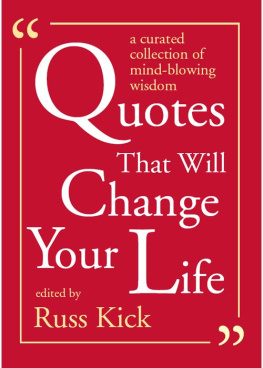
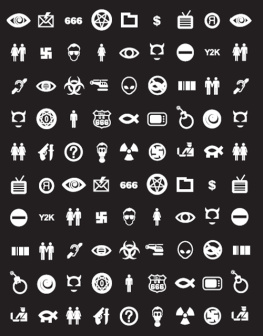
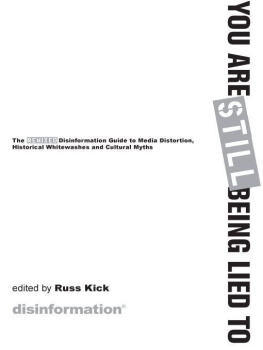

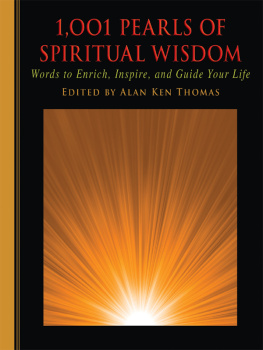
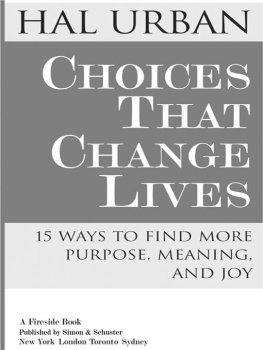
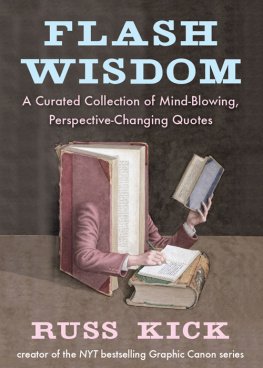
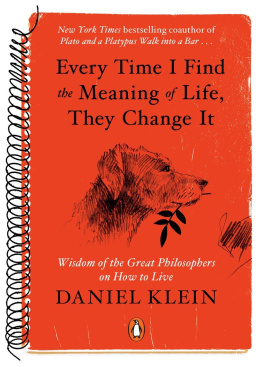
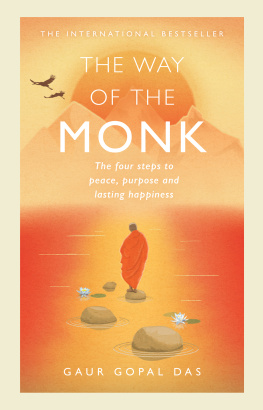
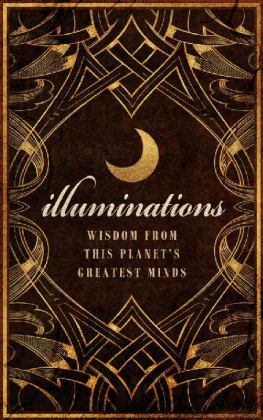

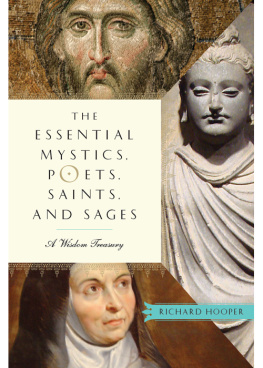
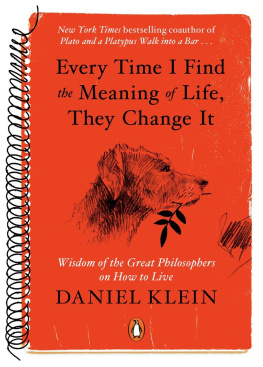

 This edition first published in 2017 by Conari Press, an imprint of Red Wheel/Weiser, LLC With offices at: 65 Parker Street, Suite 7 Newburyport, MA 01950 www.redwheelweiser.com Copyright 2017 by Russ Kick All rights reserved. No part of this publication may be reproduced or transmitted in any form or by any means, electronic or mechanical, including photocopying, recording, or by any information storage and retrieval system, without permission in writing from Red Wheel/Weiser, LLC. Reviewers may quote brief passages. Previously published in 2015 as Flash Wisdom by Disinformation Books, an imprint of Red Wheel/Weiser, ISBN: 978-1-938875-12-0. ISBN: 978-1-57324-694-1 Library of Congress Cataloging-in-Publication Data Flash wisdom : a curated collection of mind-blowing, perspective-changing, and eye-opening quotes / [edited by] Russ Kick. pages cm Summary: This book collects surprising, jolting, discomforting, and comforting insights into living a full, unbridled life, questioning authority and reality, relating to fellow humans, creating, risking, loving, living with uncertainty, and staying sane in an insane world--Provided by publisher.
This edition first published in 2017 by Conari Press, an imprint of Red Wheel/Weiser, LLC With offices at: 65 Parker Street, Suite 7 Newburyport, MA 01950 www.redwheelweiser.com Copyright 2017 by Russ Kick All rights reserved. No part of this publication may be reproduced or transmitted in any form or by any means, electronic or mechanical, including photocopying, recording, or by any information storage and retrieval system, without permission in writing from Red Wheel/Weiser, LLC. Reviewers may quote brief passages. Previously published in 2015 as Flash Wisdom by Disinformation Books, an imprint of Red Wheel/Weiser, ISBN: 978-1-938875-12-0. ISBN: 978-1-57324-694-1 Library of Congress Cataloging-in-Publication Data Flash wisdom : a curated collection of mind-blowing, perspective-changing, and eye-opening quotes / [edited by] Russ Kick. pages cm Summary: This book collects surprising, jolting, discomforting, and comforting insights into living a full, unbridled life, questioning authority and reality, relating to fellow humans, creating, risking, loving, living with uncertainty, and staying sane in an insane world--Provided by publisher. The best quotes are the ones that crystallize a truth, that offer a new way of seeing things, or that point out something that you've always known even though the thought has never fully formed in your mind.
The best quotes are the ones that crystallize a truth, that offer a new way of seeing things, or that point out something that you've always known even though the thought has never fully formed in your mind.